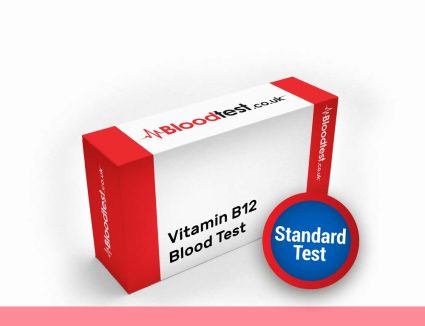Discover the Impact of Vitamin B12 Deficiency on Your Health and Wellness
Unveiling the Crucial Functions of Vitamin B12 in Human Physiology

The Vitamin B12 Blood Test in Swindon serves as a vital diagnostic tool for assessing Vitamin B12 levels, which is scientifically recognized as cobalamin. This crucial nutrient is integral to numerous physiological functions, particularly in sustaining healthy nerve cells and promoting the formation of robust red blood cells. Maintaining optimal levels of Vitamin B12 is essential for avoiding anaemia and plays a significant role in the intricate mechanisms of DNA synthesis. Furthermore, it is instrumental in ensuring the proper functioning of the brain and the entire nervous system. A deficiency in Vitamin B12 can severely hinder the body’s ability to produce sufficient healthy red blood cells, potentially leading to debilitating symptoms such as fatigue, weakness, and various neurological issues that profoundly affect an individual’s quality of life.
As the public becomes increasingly aware of dietary deficiencies, recognizing the vital significance of Vitamin B12 is crucial, particularly for those who may be susceptible to deficiency. Given that the human body lacks the capability to synthesize this vitamin, it becomes imperative to acquire it through dietary sources or supplements. Therefore, individuals should prioritize routine testing, such as the Vitamin B12 blood test in Swindon, to effectively monitor their levels and maintain optimal health.
Identifying the Primary Symptoms of Vitamin B12 Deficiency
Being able to recognize the various symptoms associated with Vitamin B12 deficiency is essential for facilitating timely intervention and treatment. Common manifestations include fatigue and weakness, which are often mistakenly attributed to routine aging or stress. Additionally, a range of neurological symptoms may present, such as numbness or tingling sensations in the extremities, balance challenges, and cognitive disturbances like memory loss and confusion, which can significantly hinder daily functioning.
The intensity and severity of these symptoms can vary greatly among individuals. Some may witness a gradual onset of symptoms, while others may experience sudden and severe manifestations of deficiency. This makes it particularly important for those in high-risk categories, including the elderly and individuals adhering to strict vegan diets, to remain vigilant, as their natural dietary sources of Vitamin B12 may not suffice.
Having a thorough understanding of the symptoms associated with Vitamin B12 deficiency empowers individuals to seek prompt medical advice and necessary diagnostic testing, such as the Vitamin B12 blood test in Swindon. Early detection is vital for improving overall health outcomes and significantly enhancing one’s quality of life.
Are You Ready to Prioritize Your Health?
 Identifying High-Risk Groups for Vitamin B12 Deficiency
Identifying High-Risk Groups for Vitamin B12 Deficiency
Certain demographic groups exhibit a heightened susceptibility to developing Vitamin B12 deficiency. Individuals who follow vegan and vegetarian diets may find it challenging to meet their nutritional requirements for this essential vitamin, underscoring the necessity of including fortified foods or dietary supplements. Moreover, older adults are particularly at risk due to age-related changes in gastrointestinal function, which can impede the absorption of nutrients.
Additionally, those dealing with gastrointestinal disorders, such as Crohn’s disease or coeliac disease, may encounter significant barriers to nutrient absorption, further heightening their risk of deficiencies. Certain medications, such as metformin for diabetes management and proton pump inhibitors for acid reflux, can also negatively impact Vitamin B12 levels. Being aware of these risk factors is crucial for making informed dietary choices and considering necessary testing, like the Vitamin B12 blood test in Swindon.
Examining the Root Causes of Vitamin B12 Deficiency

The causes of Vitamin B12 deficiency can be diverse, generally stemming from inadequate dietary intake, malabsorption issues, or the adverse effects of certain medications. For those who strictly adhere to a vegan or vegetarian diet, the absence of fortified foods or suitable supplements may lead to a deficiency that has serious health repercussions.
Malabsorption conditions, including pernicious anaemia, severely hinder the body’s ability to absorb Vitamin B12, resulting in a gradual yet significant deficiency over time. Additionally, particular medications that alter stomach acidity can obstruct absorption, necessitating consistent monitoring of levels to avert complications.
Genetic factors can also contribute to deficiency, as some individuals may inherit conditions that disrupt the metabolism of Vitamin B12. A thorough understanding of these causes is crucial for determining suitable responses, whether they involve dietary changes, supplementation, or more intensive medical interventions. This highlights the importance of regular blood testing, such as the Vitamin B12 blood test in Swindon, to effectively monitor health status.
Thorough Diagnosis of Vitamin B12 Deficiency: Testing Procedures Explained
The process of diagnosing Vitamin B12 deficiency typically involves a blood test that measures serum B12 levels alongside methylmalonic acid (MMA) concentrations. The serum B12 test determines whether adequate amounts of the vitamin are present in the bloodstream, while elevated MMA levels can indicate a deficiency, even if serum B12 levels seem normal.
For individuals showing symptoms or belonging to high-risk categories, pursuing testing is crucial. Regular health check-ups can enhance early detection, allowing for timely interventions to prevent severe health complications. In Swindon, healthcare professionals can provide invaluable guidance on effective measures, potentially recommending a Vitamin B12 blood test to assess levels and determine if dietary modifications or supplementation are warranted.
The accuracy of these tests is vital for effective health management, underscoring the importance of consulting with healthcare providers who possess a deep understanding of the complexities surrounding B12 deficiency and its possible implications. Gaining insights from test results can lead to personalized treatment plans that ensure optimal health outcomes.
Why Regular Testing Is Essential for Your Health and Well-Being
The Importance of Routine Testing for Vitamin B12 Levels

Conducting regular testing for Vitamin B12 levels is crucial for the early detection of deficiencies, which can avert serious health complications, including anaemia and nerve damage. Many individuals remain unaware of their deficiency until they begin to exhibit significant symptoms, making routine testing a vital component of healthcare, particularly for those in high-risk groups.
Timely identification allows for prompt intervention, which can lead to considerable improvements in quality of life. For example, a simple blood test can uncover deficiencies that, if neglected, may result in irreversible neurological damage. In the UK, healthcare providers advocate for testing among individuals who display symptoms or belong to higher-risk populations, emphasizing the proactive approach to health management that routine testing encourages.
For residents of Swindon, being informed about available testing options is essential. The Vitamin B12 blood test in Swindon functions not only as a diagnostic instrument but also as a means for individuals to take control of their health. With the right information, patients can make informed decisions regarding their health and treatment strategies.
Timing Your Vitamin B12 Testing for Optimal Results
Understanding the appropriate timing for testing is crucial for effectively managing Vitamin B12 levels. Individuals experiencing symptoms such as fatigue, weakness, or neurological disturbances should seek testing promptly. Additionally, high-risk groups—including vegetarians, vegans, and older adults—should consider integrating regular testing into their health maintenance routines.
The NHS recommends testing at least every two to five years for older adults and those with gastrointestinal disorders, ensuring that any deficiencies are identified before they escalate into serious health issues. Consistent monitoring provides reassurance and facilitates timely intervention, thus preventing complications associated with untreated deficiencies.
Local healthcare providers in Swindon can assist in determining the most appropriate testing schedule, particularly for individuals at risk. The Vitamin B12 blood test in Swindon can be a crucial element of a comprehensive health assessment, enabling individuals to remain informed about their nutritional status.
Interpreting Your Vitamin B12 Test Results for Informed Health Decisions
Grasping the results of a Vitamin B12 test is essential for effective health management. Normal serum B12 levels typically range from 200 to 900 pg/ml; however, interpretations may differ based on individual health conditions and presenting symptoms.
If test results indicate a deficiency, it is vital to consult with a healthcare professional to uncover underlying causes and suitable treatment strategies. Elevated levels of methylmalonic acid, even in the presence of normal serum B12 levels, can signify a functional deficiency, indicating the necessity for timely intervention.
Patients should actively engage in discussions about their results and potential next steps with their healthcare provider. The Vitamin B12 blood test in Swindon can illuminate one’s health status, empowering individuals to make informed decisions about their nutrition and supplementation strategies.
Exploring Comprehensive Testing Options for Vitamin B12 Evaluation
There are several testing methods available to assess Vitamin B12 levels and overall health status. The most commonly utilized test is the serum B12 test; however, thorough evaluations often include additional tests such as methylmalonic acid (MMA) and homocysteine levels.
MMA testing is particularly valuable, as elevated MMA levels can indicate a deficiency even when serum B12 levels appear normal. Comprehensive testing provides a more holistic view of an individual’s nutritional status and can inform treatment strategies more effectively.
For residents of Swindon, local clinics and NHS services frequently offer these tests, ensuring accessibility for those seeking clarity regarding their health. The Vitamin B12 blood test in Swindon is a valuable first step in understanding one’s nutritional needs and developing a health plan that promotes overall well-being.
Finding Reliable Vitamin B12 Testing Services in Swindon
Exploring Local Clinics Offering Essential Testing Services
Swindon is home to numerous clinics that provide Vitamin B12 testing, delivering crucial health services to the local community. Many of these clinics require a referral from a General Practitioner (GP), who can assess symptoms and recommend testing as part of a comprehensive health evaluation.
Local clinics typically offer a range of services, from basic blood tests to extensive health evaluations, ensuring that individuals receive thorough and personalized care. Seeking testing through a GP not only facilitates access to the Vitamin B12 blood test in Swindon but also ensures that results are interpreted within the broader context of the patient’s health.
For residents, exploring clinic options can expedite timely testing, particularly for those experiencing symptoms or belonging to high-risk categories. By prioritizing their health and seeking guidance from healthcare professionals, individuals can take proactive steps toward improved health management.
Private Testing Options for Enhanced Convenience and Accessibility
For those looking for quicker or more convenient testing solutions, private laboratories in Swindon offer Vitamin B12 blood tests without the need for a referral. Private testing options can be particularly attractive for individuals who prefer to manage their health independently or are concerned about wait times associated with NHS services.
These private facilities often provide a variety of health screening services, allowing individuals to address multiple health concerns in a single visit. Opting for private testing offers greater flexibility in scheduling and may even provide same-day results in some instances, enabling individuals to receive timely updates on their health status.
<pSelecting a private route for the Vitamin B12 blood test in Swindon can be an effective strategy for staying informed about nutritional levels and overall health, especially for those who require immediate answers or follow-up care.
NHS Services for Accessible Vitamin B12 Testing
The National Health Service (NHS) provides essential health services, including Vitamin B12 testing, through local GP practices. Residents in Swindon can access testing as part of routine health assessments or when they exhibit symptoms indicative of a deficiency.
NHS services are designed to ensure that individuals can obtain necessary diagnostic tests without incurring significant costs. The referral process allows GPs to evaluate each patient’s specific needs, ensuring that appropriate measures are taken to address potential deficiencies and enhance health.
For those concerned about healthcare expenses, understanding how the NHS facilitates access to the Vitamin B12 blood test in Swindon is crucial. Regular check-ups and screenings can greatly improve early detection and prevention of health complications associated with Vitamin B12 deficiency.
Preparing for Your Vitamin B12 Test: Key Steps for Success
Essential Preparations to Ensure Accurate Vitamin B12 Testing
Preparation for a Vitamin B12 blood test is vital to guarantee the accuracy of results. In many instances, fasting may be necessary for a specified period before the test. Patients should confirm detailed instructions with their healthcare provider, especially if they are on medications that could influence test outcomes.
Certain medications, including specific antacids and diuretics, can impact Vitamin B12 levels, necessitating a temporary pause in their use before testing. It is critical to maintain a meticulous record of any supplements or medications taken prior to the test, as these can significantly affect the interpretation of results.
Being well-prepared also means ensuring all necessary documentation is in place, such as a referral from a GP if required. Understanding what to expect during the testing process can help alleviate anxiety and ensure a smoother experience, particularly when scheduling a Vitamin B12 blood test in Swindon.
The Testing Process: What to Expect During Your Appointment
The procedure for obtaining a Vitamin B12 blood test is relatively straightforward and usually involves a simple blood draw. The sample is typically collected from a vein in the arm, and the entire process can often be completed within just a few minutes.
Patients may experience a brief sensation of discomfort during the needle insertion; however, the procedure is generally well-tolerated. Healthcare professionals are trained to create a comfortable environment, addressing any concerns or questions that patients may have prior to the test.
Recognizing that the Vitamin B12 blood test in Swindon is a routine procedure can help ease any apprehension. After the blood draw, individuals can usually resume their normal activities without delay, making the testing process both efficient and accessible.
Post-Test Procedures and Effective Follow-Up Strategies
After undergoing a Vitamin B12 blood test, patients may need to schedule a follow-up appointment to discuss their results with their healthcare provider. Understanding the implications of the results and determining subsequent steps is vital for effective health management.
If results reveal a deficiency, healthcare providers will typically recommend a tailored treatment plan, which may involve dietary adjustments, supplements, or injections, depending on the severity of the deficiency. This follow-up is crucial for monitoring progress and ensuring the effectiveness of the treatment strategy.
For individuals in Swindon, utilizing the Vitamin B12 blood test as a tool for ongoing health monitoring can empower them to take charge of their nutritional status and overall wellness. Regular follow-ups are essential for successful health management, as they help ensure that Vitamin B12 levels remain within a healthy range.
Post-Testing Actions: Essential Steps for Effective Health Management
Understanding Your Vitamin B12 Test Results for Optimal Health Decisions
Interpreting the results of a Vitamin B12 blood test is crucial for understanding one’s health status. Serum B12 levels are usually categorized as normal, borderline, or deficient, with interpretations varying based on individual health conditions.
For those with borderline or low levels, healthcare providers may suggest additional testing or immediate interventions to prevent progression to a complete deficiency. Understanding these results empowers patients to take proactive measures to address their nutritional requirements.
Engaging in discussions with a healthcare professional regarding results is vital for contextualizing findings within the broader scope of individual health. The Vitamin B12 blood test in Swindon can initiate a more extensive conversation about health, nutrition, and lifestyle choices necessary for optimal well-being.
Exploring Treatment Options for Vitamin B12 Deficiency
Upon receiving a diagnosis of Vitamin B12 deficiency, several treatment options are available. Dietary modifications may be the first course of action, particularly for individuals whose deficiency stems from insufficient intake. Introducing more animal products or fortified foods into the diet can help restore adequate levels.
In cases of more severe deficiencies, healthcare providers might recommend Vitamin B12 supplements or injections to quickly replenish vitamin levels. The selection of treatment will depend on individual circumstances, including the severity of the deficiency and its underlying causes.
Monitoring the effectiveness of treatment through follow-up blood tests is essential to ensure that levels are returning to normal. Being aware of treatment options and responding to changes in health status can enable individuals to manage their Vitamin B12 levels effectively, particularly with resources like the Vitamin B12 blood test in Swindon.
Ensuring Continuous Monitoring and Follow-Up Care for Optimal Health
Consistent monitoring of Vitamin B12 levels is essential to guarantee that individuals maintain adequate levels following treatment. Follow-up appointments should be scheduled according to the healthcare provider’s recommendations, especially for individuals with a history of deficiency.
Frequent testing allows for adjustments to treatment plans, ensuring that individuals receive appropriate care over time. This proactive health approach can help avert potential complications associated with Vitamin B12 deficiency, such as neurological damage or severe anaemia.
For residents of Swindon, ongoing access to the Vitamin B12 blood test is fundamental for health management, empowering individuals to take control of their nutritional status and overall health outcomes.
Incorporating Dietary and Lifestyle Strategies for Maintaining Optimal Vitamin B12 Levels
Identifying Nutrient-Dense Sources of Vitamin B12
Vitamin B12 is predominantly found in animal products, making it essential for individuals following a vegan or vegetarian diet to actively seek alternative sources. Nutrient-dense dietary sources of Vitamin B12 include meat, dairy products, eggs, and fish, all of which provide natural B12 that is critical for maintaining optimal health.
For those who avoid animal products, fortified foods such as cereals, plant-based milks, and dietary supplements can effectively bridge the nutritional gap. Being well-informed about these sources is essential for ensuring adequate intake, particularly among individuals in high-risk populations.
Incorporating a wide variety of B12-rich foods into one’s diet can promote overall health. This approach not only addresses potential deficiencies but also supports a balanced nutritional intake, making regular testing, such as the Vitamin B12 blood test in Swindon, essential for monitoring levels.
The Role of Supplements and Fortified Foods in Achieving Nutritional Balance
For individuals who find it challenging to obtain sufficient Vitamin B12 through dietary means alone, supplements and fortified foods provide a practical solution. Vitamin B12 supplements come in various forms, including tablets, sublingual tablets, and injections, catering to diverse preferences and requirements.
Fortified foods are particularly advantageous for vegans and vegetarians, offering a convenient way to ensure adequate intake. Products such as fortified cereals, nutritional yeast, and plant-based milk can significantly contribute to daily B12 needs.
Integrating these options into dietary routines enables individuals to maintain healthy B12 levels, reducing the potential risks associated with deficiencies. Ensuring access to the Vitamin B12 blood test in Swindon allows individuals to evaluate the effectiveness of their dietary modifications and supplementation efforts.
Assessing Lifestyle Factors That Influence Vitamin B12 Absorption
Lifestyle choices, particularly alcohol consumption and smoking, can profoundly affect the absorption of Vitamin B12 in the body. Excessive alcohol intake can damage the gastrointestinal lining, subsequently reducing nutrient absorption, while smoking has been linked to lower B12 levels.
Addressing these lifestyle factors is crucial for effectively managing Vitamin B12 levels. Encouraging healthier habits can enhance nutritional absorption and contribute positively to overall well-being.
Regular testing, such as the Vitamin B12 blood test in Swindon, can provide insights into how lifestyle choices impact vitamin B12 levels. Adopting a holistic approach to health, including dietary adjustments, lifestyle modifications, and ongoing monitoring, is vital for maintaining optimal well-being.
Frequently Asked Questions About Vitamin B12
What Does a Vitamin B12 Blood Test Assess?
A Vitamin B12 blood test evaluates the concentration of Vitamin B12 in the bloodstream to determine if an individual is experiencing a deficiency, which can lead to various health complications.
How Can I Recognize If I Am Vitamin B12 Deficient?
Common symptoms of Vitamin B12 deficiency encompass fatigue, weakness, numbness or tingling in the extremities, along with cognitive disturbances such as confusion or memory issues.
Who Should Consider Undergoing Testing for Vitamin B12 Deficiency?
Individuals at heightened risk, including older adults, vegans, vegetarians, and those with gastrointestinal disorders, should contemplate regular testing to monitor their Vitamin B12 levels.
What Is the Procedure for the Vitamin B12 Blood Test?
The test comprises a straightforward blood draw, typically performed from a vein in the arm, and is generally completed within just a few minutes.
What Do the Results of the Vitamin B12 Test Indicate?
Results indicate whether your Vitamin B12 levels fall into the categories of normal, borderline, or deficient, guiding any necessary dietary changes or treatments.
What Treatment Options Are Available for Vitamin B12 Deficiency?
Treatment approaches may encompass dietary modifications, oral supplements, or Vitamin B12 injections, depending on the severity of the deficiency.
How Frequently Should I Undergo Testing for Vitamin B12 Levels?
Generally, it is recommended that older adults and those at risk undergo testing every two to five years, or more frequently if symptoms present themselves.
Can I Acquire Vitamin B12 from Plant-Based Sources?
While natural plant sources of Vitamin B12 are limited, fortified foods such as cereals and plant-based milks can offer individuals following vegan or vegetarian diets adequate Vitamin B12 intake.
Is Vitamin B12 Deficiency a Serious Condition?
Yes, if untreated, Vitamin B12 deficiency can lead to severe health complications, including neurological damage and anaemia, making early detection through testing crucial.
Where Can I Access a Vitamin B12 Blood Test in Swindon?
In Swindon, testing can be conducted at local clinics, private laboratories, or through NHS services, often requiring a referral from a GP to access.
Connect with us on Facebook!
This Article Was First Found On https://bloodtest.co.uk
The Article Vitamin B12 Blood Test: Essential Guide for Swindon Residents Was Found On https://limitsofstrategy.com

